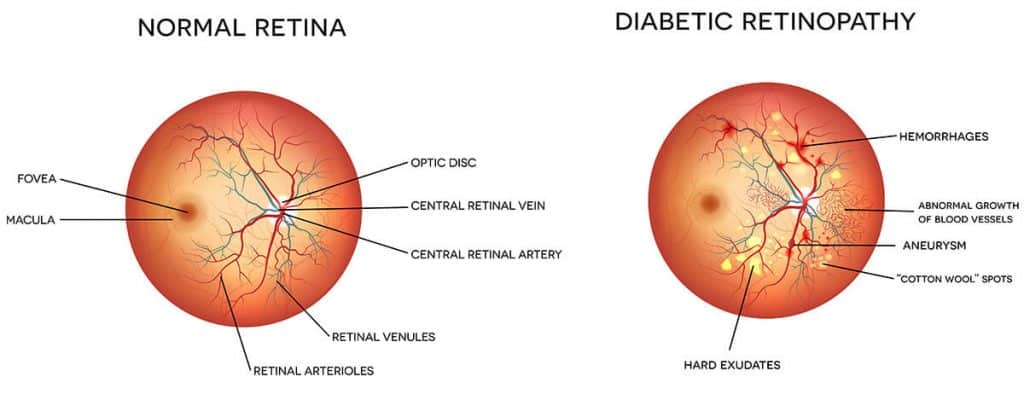Pay Your Bill Online
The retina providers at Minnesota Retina Associates are experts in diabetic retinopathy. As true partners in your retina care, our expert retina doctors will work with you to develop a treatment plan aimed at slowing or stopping the progression of the disease. Treatment depends largely on the type of diabetic retinopathy you have – and its severity. Our team can help monitor diabetic retinopathy in its earliest stages or provide medical retina care including intravitreal injections and laser treatments. Call us today to learn more.
Diabetic retinopathy affects the blood vessels in the retina. The retina is the light-sensitive tissue at the back of the eye.
Diabetic retinopathy is the most common cause of irreversible blindness in working-age Americans. It develops in more than half of the people who develop diabetes. Elevated sugar levels from diabetes can damage the small blood vessels that nourish the retina and may, in some cases, block them completely.
In the early stages, you can manage vision loss from diabetic retinopathy with proper medical management. However, it can lead to severe vision loss and blindness if diabetes is not under control.
Want to learn more about Diabetic Retinopathy? Click the button below to contact us today!
Contact UsNon-proliferative retinopathy (NPDR) is the early stage of the disease. Small areas of swelling occur, and the capillaries (tiny blood vessels) can begin to leak. Eventually, the blood vessels to the macula can close off.
Proliferative retinopathy (PDR) is an advanced stage of retinopathy. Growth factors generate new blood vessels that grow along the retina’s surface and into the vitreous gel (the fluid that fills the back of the eye). The fragile blood vessels often bleed and leak.
Diabetic Macular Edema (DME) often occurs with diabetic retinopathy. Fluid (called edema) builds up in the macula, the central part of the retina. Macular edema can damage the central vision if not treated promptly.

Regular dilated eye exams reduce the risk of developing more severe complications from the disease. With proper examinations, diabetic retinopathy can be detected before vision loss begins. There are many available treatments to help prevent, treat or sometimes even reverse damage from diabetes in the retina. Treatments most commonly performed at Minnesota Retina Associates include intravitreal injections of medication or laser treatment.
Treatments for Diabetic Retinopathy at a glance:
Serving patients in Bloomington and Golden Valley areas.
Minnesota Retina Associates
9801 Dupont Ave S., Suite 110
Bloomington, MN 55431
Minnesota Retina Associates
8501 Golden Valley Rd., Suite 200
Golden Valley, MN 55427
Minnesota Retina Associates
1455 Montreal St SE
Hutchinson, MN 55350